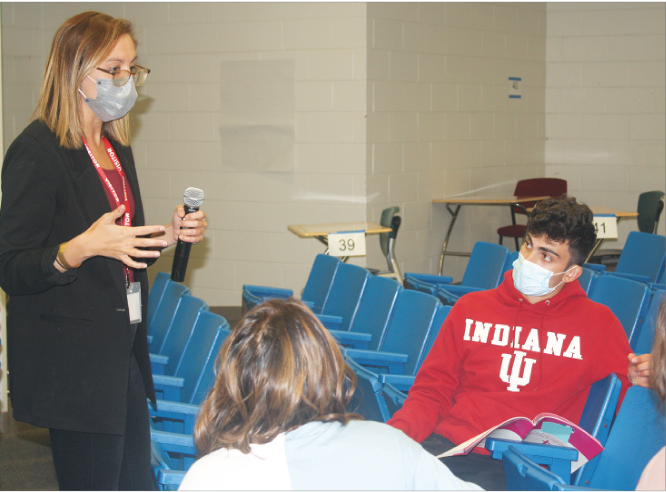Seniors certified in Mental Health First Aid
In hopes of gaining strategies to cope with inner negativity and learning how to help peers struggling with mental health, senior Paige Lawrence did not hesitate to sign up for one of the Mental Health First Aid training sessions offered by Glenbrook North when the opportunity arose.
“With friends, there’s been situations where I don’t know how to help them.
“I don’t want to report them to an adult if it’s nothing serious, but I also don’t want to ignore [the situation] in case there is something serious,” Lawrence said in a video conference.
Seniors had the option to participate in one of two Mental Health First Aid training sessions on May 10 and May 13. Two certified Mental Health First Aid trainers from the Josselyn Center, a comprehensive community mental health center in Northfield, conducted the day-long training, which provides concrete steps and tools to address mental health challenges. Those who complete a training session are certified for three years in Mental Health First Aid.
Eric Etherton, assistant principal for student services, said in a video conference that the training is a continuation of work started in the fall through the Social Emotional Learning, also known as SEL, lessons implemented in P.E. and health classes. Student feedback from the SEL program influenced the decision to provide Mental Health First Aid training.
“I would hope everybody would walk away [from the training] feeling more comfortable being able to either share their story or listen to another person’s story and be supportive,” Etherton said.
Maggie Nash, Mental Health First Aid trainer, said in a video conference that she and Becky Shulman, another Mental Health First Aid trainer, train students through an interactive, discussion-based program centered around the experiences of participants.
The training is divided into six units, each unit covering a different mental health topic. The topics include identifying warning signs both in oneself and others, trauma, substance use and crisis.
According to Lawrence, the training was the most informative and beneficial session on mental health offered by the school that she has ever experienced.
“Our group had a really big, honest and raw conversation about self-injury and self-harm,”said Lawrence.“And I guess that’s something that’s not super talked about at GBN, but probably should be, and it allowed the students that were there to just ask any question that they wanted to know more about.”
According to Nash, the training that was offered to seniors is part of a pilot program, which was created by the National Council for Behavioral Health, and is being implemented at a limited number of schools nationwide. The training curriculum continues to evolve as more youths participate and provide feedback to trainers.
“It’s a tough day,” said Nash. “It’s a heavy topic that can bring up some lived experiences. And I think it creates a really safe space to work to alleviate that stigma [around mental health] … and hopefully, the goal is to diminish it.”
According to Etherton, approximately 65 seniors signed up to participate in the training sessions. P.E. teachers and staff members in the Student Services Department were previously trained. Over the summer, other staff members can participate in training sessions, and Etherton hopes the training will eventually be a requirement for all students.
“The goal is to have … 100 percent of our students and our staff trained by the end of the 2022 – 2023 school year,” Etherton said.
School counselor Rebecca Rogers said in a video conference that there is power behind having students, staff and the community using similar language and sharing a similar understanding of mental health.
“This was a really incredible opportunity to really create a broad understanding with all the stakeholders in our community so that we could all work together and support each other,” Rogers said.
According to Lawrence, she feels all students should participate in the training.
“I think the more seriously people take this, the more beneficial it’s going to be for everyone,” said Lawrence. “I learned stuff about how to help myself, how to help my friends, and this is definitely information that I’ll need in the future. Not even just now in high school, but for the rest of my life.”


